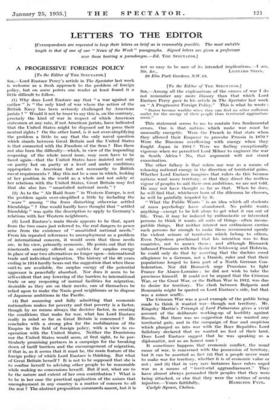LETTERS TO THE EDITOR
[Correspondents are requested to keep their letters as brief as is reasonably possible. The most suita5le length is that of one of our " News of the Week " paragraphs. Signed letters are given a preference over those bailing a pseudonym.—Ed. THE SPECTATOR.] A PROGRESSIVE FOREIGN POLICY [To the Editor of THE SPECTATOR.]
Sni,—Lord Eustacc Percy's article in The Spectator last week is welcome as a fresh approach to the problem of foreign policy, but on some points one reader at least found it a little difficult to follow.
(1) Why does Lord Eustace say that " a war against an outlaw " is " the only kind of war where the action of the British Navy has been seriously challenged by American jurists ? " Would it not be truer to say this is, on the contrary, precisely the kind of war in respect of which American statesmen at any rate, if not American jurists, have indicated that the United States might be disposed not to press their neutral rights ? On the other hand, is it not over-simplifying the problem a little to say that the only naval question which stands between Great Britain and the United States is that connected with the Freedom of the Seas ? Has there not also been the difficulty—which, in view of the impending reopening of the whole naval issue, may soon have to be faced again—that the United States have insisted not only on parity but on parity at a level and under conditions appropriate to American but not necessarily to British naval requirements ? May this not be a case in which, looking at her position in the world as a whole and not solely at her relations with the United States, Great Britain may feel that she also has " unsatisfied national needs " ?
(2) As to the " Air Raid Scare " in Western Europe, is not the problem again over-simplified a little by including the " scare " among " the fears disturbing otherwise settled friendships " ? One would hardly have thought that " settled friendship " was quite the description to apply to Germany's relations with her Western neighbours.
(3) Lord Eustace's main thesis appears to be that, apart from the two cases just referred to, the real dangers to peace arise from the existence of " unsatisfied national needs." From his repeated references to unemployment as a problem of international concern, it would seem that these needs are, in his view, primarily economic. He points out that the nineteenth century offered as outlets for surplus energy in place of war two alternatives no longer open—international trade and individual migration. The history of the 00 years ending in 1914 hardly bears out the suggestion that when these outlats are available, the surplus energy of the potential aggressor is peacefully absorbed. Nor does it seem to be self-evident that any lowering of the barriers to international trade or any reopening of normal facilities for migration, desirable as they are on their merits, can of themselves be relied upon to make the Nazis good neighbours or to dispose of Japanese ambitions in the Pacific.
(4) But assuming and fully admitting that economic nationalism makes for poverty and that poverty is a factor, though by no means always the decisive factor, in creating the conditions that make for war, what has Lord Eustace really in mind so far as Great Britain is concerned ? He concludes with a strong plea for the mobilization of the Empire in the field, of foreign policy, with a view to co- operation with the United States. Neither the Dominions nor the United States would seem, at first sight, to be par- ticularly promising partners in a campaign for the breaking down of tariff barriers and the encouragement of migration, if that is, as it seems that it must be, the main feature of the foreign policy of which Lord Eustace is thinking. But what of Great Britain herself ? It is not to be supposed that she is to confine herself to advising other people to be reasonable while making no concessions herself. But if not, what are to be the nature and extent of her own contribution ? What is to be in her case the practical application of the axiom that unemployment in any country is a matter of concern to all the rest ? The abstract proposition commands assent, but it is
not so easy to be sure of its intended implications.—I am,
Sir, &c., LEONARD STEIN. 38 Elm Park Gardens, S.W.10.














































 Previous page
Previous page